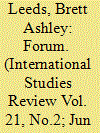|
|
|
Sort Order |
|
|
|
Items / Page
|
|
|
|
|
|
|
| Srl | Item |
| 1 |
ID:
103533


|
|
|
|
|
| Publication |
2011.
|
| Summary/Abstract |
Do military alliances lead to peace or to war? Research has suggested that defensive alliances to potential targets deter dispute initiation (Leeds 2003b:427). This would seem to suggest that forming defensive alliances is a good policy prescription for those seeking to encourage peace. Yet, some argue that even if defense pacts have a deterrence effect, defense pacts may also have other effects that increase militarized conflict in the international system. Specifically, defense pacts may encourage member states to initiate and/or escalate disputes. In an analysis covering the period from 1816 to 2000, we evaluate these three potential effects of defense pacts-deterrence, initiation, and escalation. We find support for the hypothesis that defensive alliances deter the initiation of disputes but no evidence in support of the claims that states with defensive allies are more likely to initiate disputes in the international system or that targets with allies are more likely to respond to dispute initiation with further militarization. We conclude that defensive alliances lower the probability of international conflict and are thus a good policy option for states seeking to maintain peace in the world.
|
|
|
|
|
|
|
|
|
|
|
|
|
|
|
|
| 2 |
ID:
166751


|
|
|
|
|
| Summary/Abstract |
Scholars of international studies frequently examine the interaction of power and rules in their subject of study. Our profession also has significant power dynamics and rules that are mutually constitutive. In this forum, four scholars consider aspects of the current formal and informal rules of the profession of international studies that influence our field.
|
|
|
|
|
|
|
|
|
|
|
|
|
|
|
|
| 3 |
ID:
139529


|
|
|
|
|
| Summary/Abstract |
This study examines the effect of domestic political change on United Nations General Assembly (UNGA) voting. We argue that foreign policy change is most likely when a new leader—one who relies on different societal groups for support than her predecessor—comes to power. We then examine the extent that domestic institutional context—in particular, democracy—shapes this process. We test our hypotheses using a new measure of UNGA voting patterns and new data on changes in leaders' supporting coalitions. We find that change in the societal support base of leaders leads to change in UN voting, especially in nondemocracies. This study lends credence to the perspective that foreign policy, like domestic policy, can vary with the particular interests that leaders represent; it encourages scholars to focus less on leadership change per se and more on changes in the societal groups to which leaders are most accountable. This study also suggests that democratic institutions inspire policy consistency not only in areas governed by treaties and international law, but also in areas of foreign policy that are easier to alter in the short term.
|
|
|
|
|
|
|
|
|
|
|
|
|
|
|
|
| 4 |
ID:
144088


|
|
|
|
|
| Summary/Abstract |
This article introduces the CHISOLS (Change in Source of Leader Support) dataset, which identifies which leadership changes within countries bring to power a new leader whose primary support is drawn from different societal groups than those who supported her predecessor. The dataset covers all countries of the world with populations greater than 500,000 from 1919 to 2008. We discuss the underlying rationale of our data collection, provide some brief information about the coding rules and procedures, and share some descriptive statistics. We find that changes in sources of leader support are more common in democracies than non-democracies, but also that changes in sources of leader support often occur without irregular leader transitions or large institutional changes, even within non-democracies. CHISOLS can be productively combined with other datasets like POLITY, Archigos, and DPI that provide information about political institutions, modes of leader transition, and placement on a left–right policy continuum, but CHISOLS also provides something new that was not previously available. These data allow researchers to study the extent to which different types of policy change are associated with all leader transitions, with changes in political institutions, or with changes in the set of interests that leaders most closely represent; CHISOLS facilitates comparing the effect of leaders, interests, and institutions on policy change across a wide spatial temporal domain.
|
|
|
|
|
|
|
|
|
|
|
|
|
|
|
|
| 5 |
ID:
179867


|
|
|
|
|
| Summary/Abstract |
In the current era, many of the military threats that state leaders face come from domestic and transnational nonstate actors. Military alliances are recognized as an important policy strategy to counter military threats, but existing research has primarily been focused on threats from other states and has difficulty uncovering a consistent relationship between external threat and alliance formation. We argue that this discrepancy arises from the failure to recognize that many threats are not external to the state. We contend that alliance formation is motivated both by external threats from other states and by internal threats that make civil conflict more likely. Moreover, we argue that leaders design alliance obligations differently when faced with internal threats. An empirical analysis of alliance formation from 1946 to 2009 shows that while external threats motivate the formation of defense pacts, internal threats encourage the formation of consultation pacts. Internal threats with the greatest potential for internationalization also encourage the formation of neutrality/nonaggression pacts. This research deepens our understanding of how states design security policies to deal with the threats posed by nonstate actors, a salient concern of leaders in the twenty-first century, and helps us to understand the variety of alliance obligations that we observe.
|
|
|
|
|
|
|
|
|
|
|
|
|
|
|
|
| 6 |
ID:
134977


|
|
|
|
|
| Summary/Abstract |
Creating institutions that effectively manage interstate conflict is a priority for policy-makers. In this article we demonstrate that military allies are well positioned to influence the crisis-bargaining behavior of both challengers and targets in ways that often lead to peace. Through a three-player game-theoretic model, we demonstrate that a target's alliances not only have an effect on the demand that the challenger makes, but also on the behavior of the target. When a target values an alliance highly, an ally's recommendation for settlement can encourage the target to concede to demands without further escalation. Our statistical analysis provides evidence in support of the theoretical finding. Allies can both deter challengers and restrain partners, and as a result, can encourage peaceful behavior not only from adversaries, but from member states as well. Our study thus sheds new light on the role of military alliances as potential conflict management devices.
|
|
|
|
|
|
|
|
|
|
|
|
|
|
|
|
| 7 |
ID:
072703


|
|
|
|
|
| Publication |
2006.
|
| Summary/Abstract |
The authors appraise a well-known argument connecting economics and security in international relations: military allies are likely to trade more with one another than non-allies. A review of alliance treaties and diplomatic history suggests that, under certain conditions, states may tie together alliance agreements and economic agreements. When states explicitly link alliance agreements with economic cooperation, one would expect to see increased economic exchange coinciding with coordinated security policies. This article evaluates whether the linking of economic and security agreements accounts for a positive relationship between alliances and trade among European states before World War II and produces evidence in support of this argument. Trade among allies who have specified economic cooperation in their alliance agreements is higher than trade among non-allied states and higher than trade among allies who have not promised economic cooperation. In contrast, trade among allies without specific economic provisions in their treaties is statistically no different from trade among non-allies. Thus, the positive empirical relationship between alliances and trade that the authors find in pre-WWII Europe is a result of only a specific subset of all military alliances, namely, those treaties that stipulate economic cooperation between the allies. This study advances our understanding of the alliance-trade relationship by focusing attention on the joint negotiation of cooperation in different issue-areas.
|
|
|
|
|
|
|
|
|
|
|
|
|
|
|
|
|
|
|
|
|